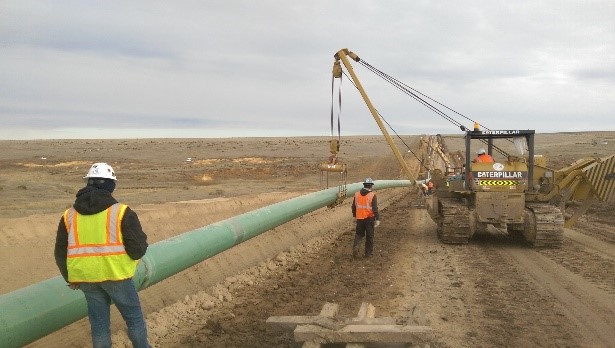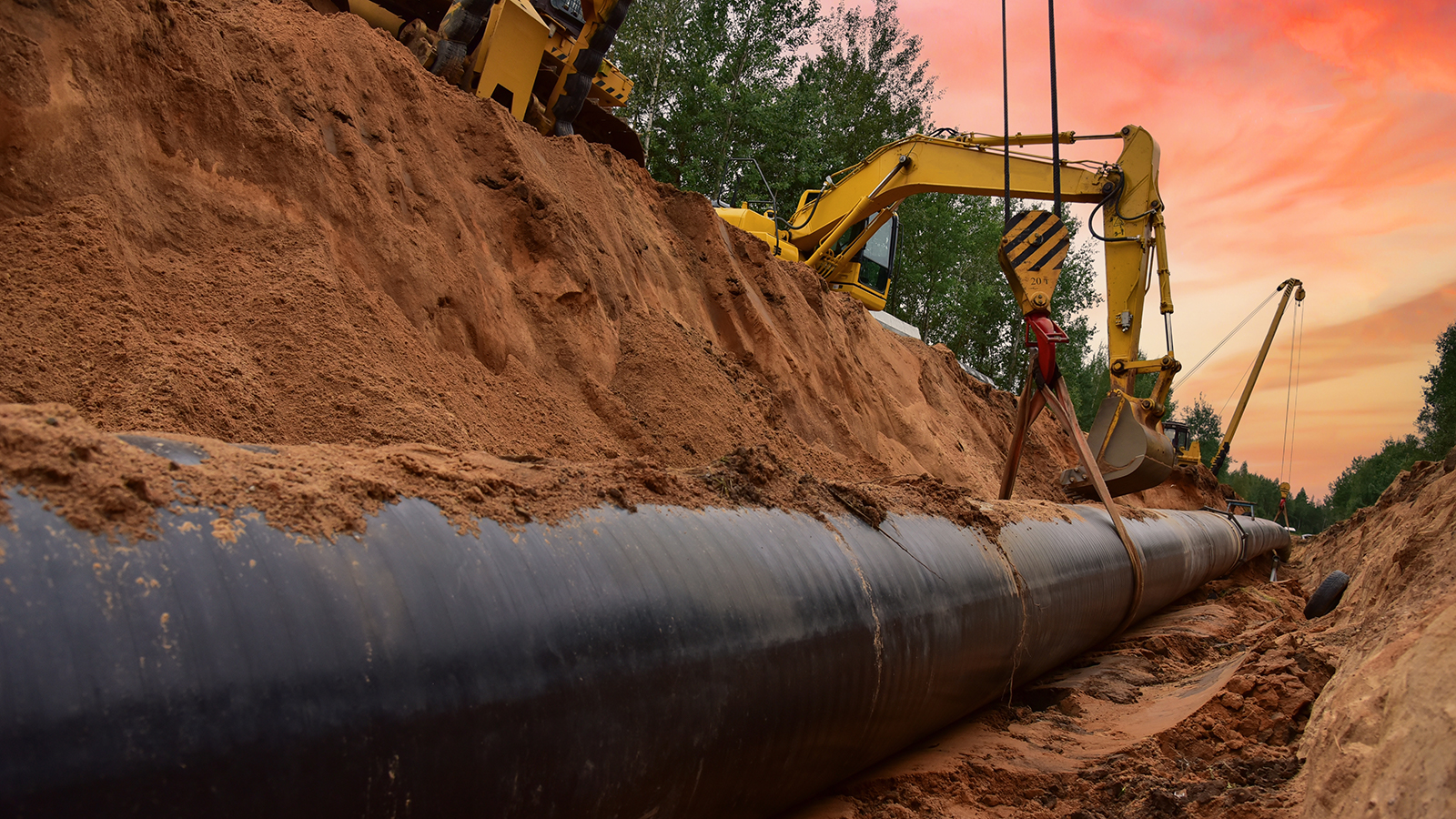A Comprehensive Overview to Recognizing Pipes and Their Role in Construction
Pipes are necessary parts in building and construction, offering essential features in water, gas, and waste monitoring. Their option and application can considerably influence a building's effectiveness and safety. Numerous products, such as PVC, copper, and PEX, provide distinct benefits fit to particular needs (Creek Pipe Pipeline Construction). Recognizing these variables is crucial for any building and construction job. As one discovers the ins and outs of pipelines, the effects for compliance and public health become significantly apparent
The Relevance of Water Lines in Building and construction
Pipes function as necessary conduits in building and construction, assisting in the movement of water, gas, and waste throughout structures and infrastructure. Their function expands past plain transportation; they are vital for making certain the functionality and safety and security of commercial and domestic environments. Appropriately installed pipes add to the reliable distribution of sources, enabling everyday tasks such as heating, food preparation, and showering. Pipelines play an essential duty in waste monitoring, ensuring that sewer and wastewater are successfully removed from living spaces.The significance of pipes is also reflected in their effect on public wellness. Faulty or inadequate piping systems can result in contamination and harmful problems, making top quality products and setup methods essential. Additionally, pipelines must adhere to different building regulations and guidelines, which are created to protect both passengers and the setting. Subsequently, the relevance of pipes in building and construction encompasses both sensible capability and crucial health considerations.
Sorts Of Pipes Made Use Of in Building Jobs
Different types of pipelines play a considerable function in structure jobs, each developed to meet specific requirements and applications. Among one of the most frequently utilized pipe kinds are PVC, which is resistant and light-weight to rust, making it optimal for water drainage and vent systems. CPVC pipelines, similar to PVC, can withstand greater temperatures, commonly utilized in warm water systems. Copper pipes are recognized for their toughness and reliability, often employed in pipes and home heating applications. Galvanized steel pipes, while much less usual today, were once a standard for water lines due to their stamina. In Addition, PEX (cross-linked polyethylene) pipes are acquiring appeal for domestic pipes as a result of their flexibility and resistance to scaling and chlorine. Cast iron pipelines are favored for their sound-dampening residential properties, generally utilized in waste and dirt systems. Each pipeline kind serves distinct functions, making certain efficient operation in building jobs.
Usual Materials for Water Lines and Their Feature
In construction, the choice of pipe products is crucial for making certain resilience and performance. Steel pipes offer strength and resistance to high pressures, while plastic pipes provide lightweight and corrosion-resistant alternatives. Composite pipes incorporate the benefits of both products, making them functional alternatives for numerous applications.
Metal Pipeline Options
Metal pipelines are integral elements in building and construction, supplying an array of choices that accommodate ecological conditions and different applications. The most usual products include steel, copper, and cast iron. Steel pipes are known for their toughness and resilience, making them suitable for high-pressure applications. Copper pipes are favored for their corrosion resistance and antimicrobial buildings, commonly utilized in pipes systems. Cast iron pipelines offer outstanding audio insulation and are excellent for waste and drainage systems. Each metal kind has unique advantages; as an example, galvanized steel can withstand corrosion, while stainless-steel provides superior deterioration resistance. Choosing the proper metal pipeline depends upon factors such as price, ecological direct exposure, and the particular needs of the building and construction project.

Plastic Pipeline Advantages
Plastic pipes have actually gained popularity in building and construction because of their light-weight nature and flexibility. These pipelines, made from materials such as PVC, CPVC, and PE, offer superb resistance to rust and chemical damage, making them ideal for different applications. Their convenience of installation additional boosts their appeal, as they can be cut and signed up with without unique tools. Furthermore, plastic pipelines are generally a lot more cost-efficient compared to metal choices, contributing to reduced overall project costs. Their smooth interior surfaces decrease rubbing and enhance flow rates, while insulation homes assist keep temperature level control in pipes systems - Creek Pipe Pipeline Construction. With a wide variety of dimensions and configurations available, plastic pipes efficiently satisfy the diverse requirements of modern-day construction projects
Composite Pipe Characteristics
Compound pipes combine various materials to leverage their individual strengths, leading to improved efficiency and sturdiness. Commonly, these pipelines contain layers that might include porcelains, steels, and plastics, each contributing one-of-a-kind residential or commercial properties. The inner layer might be made of a corrosion-resistant product, while the outer layer offers stamina and impact resistance. This mix permits composite pipes to withstand extreme temperature levels and stress, making them suitable for a vast array of applications, consisting of water supply and commercial processes. In addition, composite pipelines are typically lighter than standard materials, facilitating less complicated handling and setup. Their versatility and flexibility to various settings make them a favored option in modern-day building and construction jobs, ensuring long life and efficiency in fluid transport systems.
Applications of Piping in Plumbing Equipments

Electric Conduits: The Duty of Pipes in Electrical wiring
In modern building, electric conduits play an important function in making certain the reliable and secure transmitting of electrical circuitry throughout structures. These pipelines offer a protective path for electric wires, guarding them from physical damage and ecological variables. Various materials, such as PVC, steel, and adaptable avenues, are utilized depending on the particular requirements of the installation.Furthermore, avenues aid in arranging circuitry systems, lowering the threat of electric threats like brief circuits or fires. They also facilitate simpler maintenance and upgrades, as cords can be accessed and replaced without significant disruption to the structure.Proper installation of electrical conduits is important for compliance with building ordinance and security policies. This structured method not only enhances the longevity of the electrical system yet additionally adds to the total safety and security and capability of the structure, making electric avenues important in contemporary construction practices.
Picking the Right Pipe for Your Project
How can one assure the ideal pipe selection for a building project? The choice procedure begins with recognizing the specific demands of the task, consisting of the sort of fluids being carried, stress scores, and environmental conditions. Product options, such as Copper, pvc, and steel, ought to be assessed based upon resilience, rust resistance, and thermal properties.Next, one should consider the pipeline's size and you could check here circulation capacity to identify reliable procedure. Regulatory standards and codes must likewise be adhered to, as they determine the acceptable products and methods for certain applications. Consulting with specialists and using extensive resources can better assist in making informed decisions.Finally, evaluating the cost-effectiveness of numerous alternatives is crucial, balancing first expenses with long-term upkeep and substitute expenses - Creek Pipe Midland. By thoroughly analyzing these variables, one can confidently select the most ideal pipeline for their building and construction project, assuring both performance and compliance

Maintenance and Inspection of Piping in Building and construction
Appropriate selection of pipelines sets the foundation for their long-term efficiency, making upkeep and assessment vital parts in building and construction. Routine maintenance warranties that any possible issues, such as leakages, rust, or obstructions, are recognized and dealt with immediately, lessening costly repair services and project hold-ups. Scheduled evaluations, including visual analyses and pressure examinations, play a vital duty in examining the stability of pipe systems.Additionally, keeping an eye on environmental elements, such as temperature fluctuations and soil conditions, can aid anticipate damage. Utilizing advanced innovations, such as CCTV for indoor assessments, can boost the efficiency of upkeep efforts. It is important to document evaluation searchings for and upkeep activities to establish a thorough history of the pipeline systems. By prioritizing maintenance and examination, construction experts can prolong the life-span of their piping systems, guaranteeing they operate successfully and accurately throughout the task's duration.
Frequently Asked Concerns
Just How Do Pipelines Affect Energy Effectiveness in Structures?
Pipes significantly affect power performance in structures by managing heating and cooling systems. Appropriate insulation and materials decrease energy loss, while effective pipes designs lessen water use, inevitably bring about reduced power intake and functional expenses.
What Laws Govern Pipe Setup in Construction?
Regulations governing pipe installment in building commonly consist of nationwide and regional building codes, plumbing codes, and safety criteria. These warranty conformity with structural integrity, material requirements, and wellness demands, promoting safety and efficiency in construction techniques.
Can Water Lines Be Recycled After Use?
The concern of pipeline recyclability is considerable. Many products, such as metal and particular plastics, can be recycled effectively. The problem and type of pipeline influence reusing feasibility, requiring proper evaluation before disposal.
How Do Climate Condition Influence Pipe Performance?
Weather substantially influence pipeline performance. Severe temperatures can trigger development or contraction, while wetness might lead to rust. In addition, heavy precipitation can raise soil pressure, influencing security and overall performance of the piping system.
What Are the Signs of Pipe Failure to Look For?
Signs of pipe failure include leakages, uncommon noises, discoloration of water, reduced water stress, and visible corrosion. Routine assessments can aid spot these issues early, making sure and protecting against pricey fixings system functionality in the long-term. Pipes play a crucial duty in waste management, guaranteeing that sewage and wastewater are successfully eliminated from living spaces.The relevance of pipelines is additionally mirrored in their influence on public wellness. In building and construction, the selection of pipe materials is vital for guaranteeing toughness and capability. Steel pipelines use stamina and resistance discover here to high pressures, while plastic pipes provide light-weight and corrosion-resistant options. Additionally, pipes are made use of to get rid of wastewater, linking bathrooms, sinks, and drains to municipal sewer systems or septic tanks.Different kinds of pipelines, such as PVC, copper, and PEX, are chosen based on factors like resilience, cost, and details application demands. How can one ensure the ideal pipe selection for a building and construction job?
Comments on “The Evolution of Leak Detection Technology with Creek Pipe Midland”